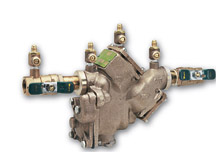The city’s decision to suddenly start enforcing a building code policy that has been ignored for 10 years – requiring water backflow preventer devices in certain condos and buildings – has caused a backlash from property owners.
The property owners say they now face extensive new re-piping work, and are getting expensive quotes from plumbers.
A backflow preventer is a device that protects drinking water from contamination by stagnant water in sprinkler system lines. The device must be installed in accordance with plumbing or building codes.
Sine last fall, Jersey City’s Office of the Construction Official has sent out over 1,700 letters to condo owners, owners of multi-unit residential buildings, and owners of industrial and corporate businesses, telling them that a city plumbing inspector will soon inspect their building to see if it has a backflow prevention device installed.
The letter states, “The consumer, at his/her own expense, shall install, operate, test and maintain approved backflow prevention assemblies as directed by the authority having jurisdiction.”
Condo owners say they have found themselves looking at expenses upwards of $30,000 to install not just a backflow preventer, but also an entire new piping system to enable access to the device for future testing and inspection.
Anyone not in compliance could face a $2,000 weekly fine.
Murky waters
After City Councilman Steve Fulop received numerous e-mails and calls to his office about the issue, he set up a meeting on March 30 at City Hall. He, along with representatives from the city’s Construction Office and the Jersey City Municipal Utilities Authority, listened to the concerns of those who received the letters.
Thanks to the meeting, new letters will be sent out in the next two weeks, describing exactly what property owners need to do to have backflow preventer devices installed.
After the letters are sent out, there will be 90-day period to allow them to comply and to prepare for any costs they will incur. A further study of the issue is also planned.
“I could appreciate [that the city wants] to enforce,” Fulop said recently in an interview, “but all of a sudden, one day, you just say ‘We want to do this’…that’s not a good job on the city’s part.”
Fulop said that he learned that the city should have been enforcing the law, set by the state, over the past 10 years. Instead, Fulop said, the city granted Certificates of Occupancy for residential buildings without making sure that the buildings had the proper backflow preventer devices.
Fulop’s claims were backed up by a city employee connected to the Construction Office (who wanted to remain unnamed) while speaking to the Jersey City Reporter.
Residents fearful
One resident, a condo owner on Bright Street in downtown Jersey City, said in an e-mail to the newspaper that she needs more clarification on this issue. She also wants to know why the city wants residents to use the plumbers that were “recommended” in the city’s letter.
The resident said that based on notes she took at the March 30 meeting and in speaking to other residents, those plumbers have offered installation estimates ranging from $1,000 to $20,000.
“When we suggested that the city/JCMUA participate in cost sharing with the condo associations, that idea was dismissed.” – A downtown Jersey City resident
________
“When we suggested grandfathering in certain condos, because the city has decided to enforce a code that has been on the books for more than 10 years, that idea was dismissed,” the resident said. “When we suggested that the city/JCMUA participate in cost sharing with the condo associations, that idea, too, was dismissed.”
Aaron Morrill, who lives with his wife in downtown Jersey City in an eight-unit condo building, said the residents in the building have no problem with compliance but want the city to understand their economic plight.
“The plumber that came here said we would have to pay $11,000 for not only installing the device but also for the labor in putting in the device, and other costs,” Morrill said. “That’s an extra cost that each unit in my building would have to bear, especially in these economic times.”
Ricardo Kaulessar can be reached at rkaulessar@hudsonrreporter.com.
